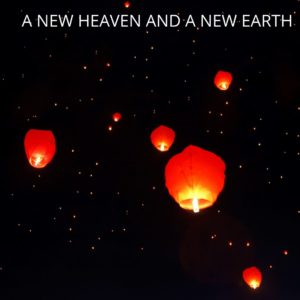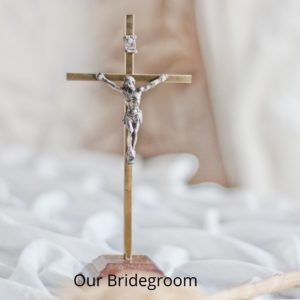The wedding feast of the Lamb. It is the ultimate repast, the climax of our faith, what the faithful look forward to when this world is over. Revelation 19:5-9 describes it as follows:
“Then there came from the throne the sound of a voice, saying, “Praise our God, all his servants and all people, both great and small, who have reverence for him!” Then I heard what sounded like a crowd, like the sound of a roaring waterfall, like loud peals of thunder. I heard them say, “Praise God! For the Lord, our Almighty God, is King! Let us rejoice and be glad; let us praise his greatness! For the time has come for the wedding of the Lamb, and his bride has prepared herself for it. She has been given clean shining linen to wear.” (The linen is the good deeds of God’s people.) “Then the angel said to me, “Write this: Happy are those who have been invited to the wedding feast of the Lamb.” And the angel added, “These are the true words of God.”
Further on, Revelation 21:1-3 provides an additional depiction:
“Then I saw a new heaven and a new earth. The first heaven and the first earth disappeared, and the sea vanished. And I saw the Holy City, the new Jerusalem, coming down out of heaven from God, prepared and ready, like a bride dressed to meet her husband. I heard a loud voice speaking from the throne: “Now God’s home is with people! He will live with them, and they shall be his people. God himself will be with them, and he will be their God.”

For a long time, I did not really understand what the wedding feast of the Lamb was exactly, let alone how “Human Marriage” related to it. This feast seemed so spiritual and esoteric. It was awfully hard for me to grasp. I came to realize the Eucharist was also a renewal of our marriage covenant with Christ (the New Covenant), and his bride would be unveiled in all her fullness in the new heaven and the new earth.
But how did earthly marriage mirror this? A hint was given to me in §1642 of the Catechism of The Catholic Church (CCC), which states the following about the sacrament of marriage:
“…Christ dwells with them, gives them the strength to take up their crosses and so follow him, to rise again after they have fallen, to forgive one another, to bear one another’s burdens, to “be subject to one another out of reverence for Christ,” and to love one another with supernatural, tender, and fruitful love. In the joys of their love and family life he gives them here on earth a foretaste of the wedding feast of the Lamb.” (emphasis added)
This helped me to better understand. In the wedding feast described in the later chapters of the Book of Revelation, God will complete the wedding of himself to us eternally. Marriage is the closest, most intimate relationship there is. God wants this relationship with his people. When we live out our earthly marriages in forgiveness, bearing with one another’s burdens and self-giving love, we are the face of Christ for our spouse. It is in the reflection of his face that a contemplation of the wedding supper of the Lamb can be experienced here on earth.
I began to wonder if all biblical imagery of marriage has ultimately been pointing to the wedding feast of the Lamb, beyond its originally intended purpose? In the beginning, God “created man out of love” and “man is created in the image and likeness of God who is himself love.” (CCC §1604). God wanted a relationship of love with man. He walked in the cool of the day with Adam and Eve until sin destroyed the relationship. It appears to me that God will once again be united with his people in the same way after the wedding feast of the Lamb. He will be present with them. “Now God’s home is with people! He will live with them, and they shall be his people. God himself will be with them, and he will be their God.” (Rev 21:3)
In the Old Testament, the prophets consistently reference marriage as a description of the relationship between God and Israel. St. Paul does the same in the New Testament to describe the relationship between Christ and the church. This is precisely what God will have with his people in the new heaven and the new earth; to be eternally wedded to them. It is always a marital relationship that God has desired with his people!
When Jesus instituted the Eucharist at the Last Supper, he told the Apostles to “do this in remembrance of me.” We know that at the sacrifice of the mass, Catholics receive the body, blood, soul and divinity of Jesus Christ in this sacrament. We are united to Jesus completely in the Eucharist when we partake in it. Could this sacrament also be a participation in the wedding feast of the Lamb, a prelude to the time when God will be eternally wed to his people?
With marriage, there is a consistent mystery present: self-sacrificial love; a sincere gift of spousal love; Christ and his Church. The mystery is always current, and the mystery is always pointing to the future.
This topic would not be complete without a discussion of the question posed to Jesus by the Sadducees about marriage after the resurrection (see Matthew 22:23-33; Mark 12:18-27; Luke 20:27-38). In all three of these Gospels, the story is basically the same:
“Then some Sadducees, who say that people will not rise from death, came to Jesus and said, “Teacher, Moses wrote this law for us: ‘If a man dies and leaves a wife but no children, that man’s brother must marry the widow so that they can have children who will be considered the dead man’s children.’ Once there were seven brothers; the oldest got married and died without having any children. Then the second one married the woman, and then the third. The same thing happened to all seven – they died without having children. Last of all, the woman died. Now, on the day when the dead rise to life, whose wife will she be? All seven of them married her.”
“Jesus answered them, “The men and women of this age marry, but the men and women who are worthy to rise from death and live in the age to come will not then marry. They will be like angels and cannot die. They are the children of God, because they have risen from death. And Moses clearly proves that the dead are raised to life. In the passage about the burning bush he speaks of the Lord as ‘the God of Abraham, the God of Isaac, and the God of Jacob.’ He is the God of the living, not of the dead, for to him all are alive.”
The Sadducees were a group of Jews existing at that time who did not believe in the resurrection of the body, the immortality of the soul, nor in angels (New Advent, Catholic Encyclopedia, Sadducees). The Sadducess wanted to poke fun at the resurrection, something their sect did not believe in. The basis for their question was the Law of Moses, known as a “levirate” marriage. The levirate marriage provided that should a man die without any children, his brother had a duty to marry the man’s widow to have children and leave heirs in the brother’s name. Of course, the Sadducees were quite creative with this story, as there were seven brothers who married the woman, had no children and everyone died!
Jesus, however, was not tricked by their question. In his response, Jesus did two things. He corrected the Sadducees via the scriptures on their view of the immortality of the soul and the resurrection. Jesus then went on to reveal something for all of us about the state of marriage after the resurrection of the body: “For when they rise from the dead, they neither marry nor are given in marriage, but are like angels in heaven.” (Mark 12:25)

This scripture passage was also enigmatic to me. Was marriage no longer needed? Was it going away? What was Jesus saying here? There are many ideas and theories as to what Jesus meant when he made this statement. Unfortunately, there is not enough space to expound upon all of them here. The Church has always taught the primary purpose of marriage is the good of the spouses, procreation and the education of children (CCC 1601). In the new heaven and the new earth, there will be no death. The purpose that marriage serves here on earth will no longer be needed. The reason that makes the most sense to me, however, about earthly marriage passing away is the one that I heard my Bishop preach at a conference I attended: There will no longer be a need for we humans to marry in the world to come because we will be married to God. Marriage will still exist in its perfected fullness with the eternal marriage of God and his people.
By Julieanne M. Bartlett All Rights Reserved Copyright 2020